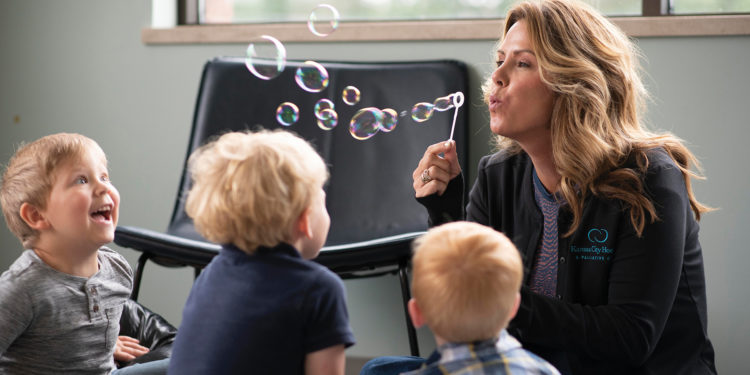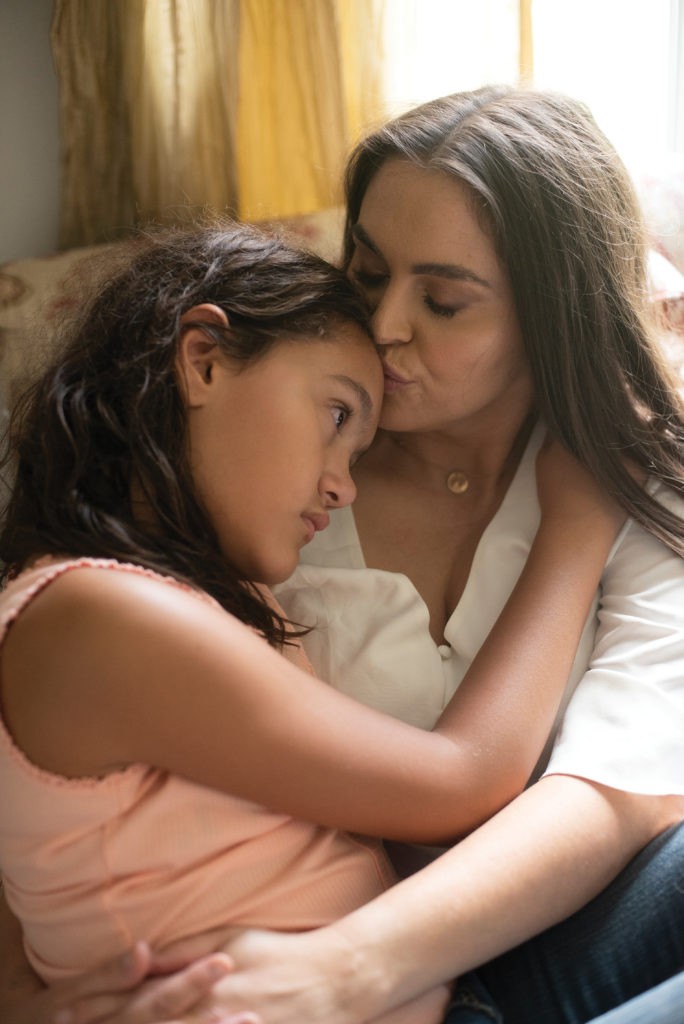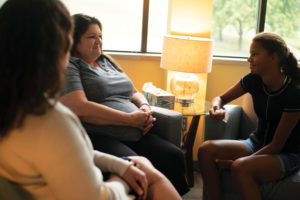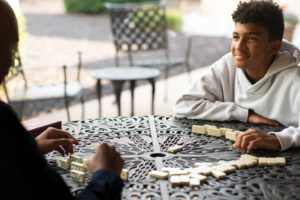The healing power of communication

Story by Lisa Templeton-Farmer
 Most of us realize the need for support during a difficult life transition or significant change, however reluctant we might be to accept help from those around us. This may be especially true for the transition that comes after the death of a loved one. Learning to navigate your day-to-day and enjoy life’s moments without that person can feel unfamiliar and uncomfortable. For children, experiencing the death of a family member can be especially painful and even traumatic. Fortunately, there are ways the living adults in a grieving child’s life can make a meaningful impact, not just for their grief journey today but for their success in the future.
Most of us realize the need for support during a difficult life transition or significant change, however reluctant we might be to accept help from those around us. This may be especially true for the transition that comes after the death of a loved one. Learning to navigate your day-to-day and enjoy life’s moments without that person can feel unfamiliar and uncomfortable. For children, experiencing the death of a family member can be especially painful and even traumatic. Fortunately, there are ways the living adults in a grieving child’s life can make a meaningful impact, not just for their grief journey today but for their success in the future.
Realizing an article about grieving children likely doesn’t top your list of sought-after reading topics, it’s an important subject to make time for as it’s all too common. Every day, 850 American children lose a parent and, nationally, 73 million children are grieving, as reported in America’s Forgotten Orphans, a collaborative research study by Pennsylvania State University and the University of Southern California. Although this might not reflect your own family’s current experiences, grief and loss are universal and inescapable. Everyone who loves will grieve the loss of someone important to them at some point in their life.
How can you best help the children and teens you love cope with this ever-present fact? Be willing to talk openly and honestly. Just like so many other things in a child’s life, seize the teachable moments. Recognize times when you have the opportunity to help a child practice coping skills; for example, if they come to you with questions when the pet of a neighbor or the grandparent of a classmate dies. Listen to them, sit with them, answer their questions, and ask them what they understand and what they are still seeking answers for. This will serve you well when the lifespan of someone they love nears its end or a sudden and unexpected event happens.
You may wonder how to talk honestly with a child about death and loss. It’s not that different from any other meaningful conversation. You do NOT need to have all the answers, but only be willing to explore the territory with them. While all of us desperately want to protect our children and teens from this reality, it’s not possible, making it all the more important to help them process and cope with the feelings they will face. Honest conversation will not scar children. In fact, the opposite is true; not talking and leaving them to come up with answers on their own is much more difficult for them.
 Tips for meaningful conversation
Tips for meaningful conversation
How do you start? Again, seize the teachable moment. What has happened? Do they have questions? Identify yourself as someone who they can trust, ask questions of, and receive honest answers from. Starting the conversation can be as straightforward as saying ‘someone has died’, explaining what happened, and talking about what happens next and what this means for your family.
Use age-appropriate language to explain honestly what happened. Examples include: the disease they have been fighting could no longer be managed; there was a terrible accident; their heart suddenly stopped working; or, they or someone else ended their life. Recognizing these are realities you want to spare children from, take a moment to consider whether you want to be the adult to discuss these difficult events with them or leave them to discover answers on their own. Secrets are very hard to maintain but honesty goes a long way in helping a child understand what has happened, which is the first step to being able to cope and adjust to the loss and significant change in their life.
 Once you have discussed death and loss with a child or teen, you may wonder what comes next. Explore how people feel when someone important to them dies. Initially, numbness or shock may be the predominant feeling for grieving children. Over time you can expect sadness, of course, anger, regret, confusion, and anxiety or fear. Exploring with youth how this might feel or might be visible in others can help them know they are not alone in their feelings. It is very healing for kids when they are helped to understand that what they are feeling is typical during a difficult life experience. You are also modeling for them and providing reassurance that you are a safe person to discuss feelings with and will provide an honest response. If a family member dies while receiving hospice care, remember your family is able to receive grief support from your hospice provider for a year following that loss. There are also community resources for complicated or unexpected loss through Kansas City Hospice & Palliative Care’s Solace House center for grief and healing.
Once you have discussed death and loss with a child or teen, you may wonder what comes next. Explore how people feel when someone important to them dies. Initially, numbness or shock may be the predominant feeling for grieving children. Over time you can expect sadness, of course, anger, regret, confusion, and anxiety or fear. Exploring with youth how this might feel or might be visible in others can help them know they are not alone in their feelings. It is very healing for kids when they are helped to understand that what they are feeling is typical during a difficult life experience. You are also modeling for them and providing reassurance that you are a safe person to discuss feelings with and will provide an honest response. If a family member dies while receiving hospice care, remember your family is able to receive grief support from your hospice provider for a year following that loss. There are also community resources for complicated or unexpected loss through Kansas City Hospice & Palliative Care’s Solace House center for grief and healing.
We recognize these conversations can be tough, but they are also very valuable. If you are able to have an engaging dialogue with youth, you may well be surprised that it was less difficult than you anticipated and that it was beneficial for you too. The wisdom of children willing to share can be surprising, and a healing part of the journey for the whole family.
Kansas City Hospice offers comprehensive guidance through expert staff and resources online at KCHospice.org






